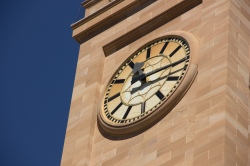 Yes. Simply put, selihoth are, by definition not governed by the rest of the halachoth that govern other prayer services because they were not legislated by our sages. In the medieval period, it was assumed that selihoth were said at the last part of the night, in the period before dawn that would be too early for the morning services, such that selihoth would lead in to shaharith, which was timed so that the amida, the silent devotion, would begin at sunrise. The Rishonim and decisors, including the Rif, the Rosh, the Tur, Maimonides, and the Beth Yosef and the Rema were familiar with this meritorious but always voluntary practice, and they also never believed that selhihoth had to be recited during a particular time, nor did they ever believe or write that there was a time of day when selihoth should not be recited.
Yes. Simply put, selihoth are, by definition not governed by the rest of the halachoth that govern other prayer services because they were not legislated by our sages. In the medieval period, it was assumed that selihoth were said at the last part of the night, in the period before dawn that would be too early for the morning services, such that selihoth would lead in to shaharith, which was timed so that the amida, the silent devotion, would begin at sunrise. The Rishonim and decisors, including the Rif, the Rosh, the Tur, Maimonides, and the Beth Yosef and the Rema were familiar with this meritorious but always voluntary practice, and they also never believed that selhihoth had to be recited during a particular time, nor did they ever believe or write that there was a time of day when selihoth should not be recited.Later, and on the influence of the Zohar, it was believed that the ideal time for selihoth (and other prayers, by the way) was the second half of the night. It was also believed that the first half of the night was for some reason not the best time for supplication. This practice was mentioned by the Magen Avraham, but it must be reiterated that it was foreign to those who lived before him and also not codified as law, for the above stated reason: it was a preference best on post-talmudic consideration. I am therefore at a a loss to understand the later halachic literature, foremost the position of Rabbi Ovadiah Yosef, who made the assertion that there was, therefore, some sort of problem, and possibly prohibition, or even danger, in reciting selihoth before midnight just because it was not the best time according to a mystical understanding. I am also not capable of explaining why, in a similar responsum, Rabbi Moshe Feinstein, who assumes the same halachic background as presented here, does not make the logical conclusion and state that there is absolutely no halachic problem with reciting the selihoth before midnight, instead giving a temporary emergency dispensation. I am therefore disappointed that in all of the subsequent literature that I have found, making the illogical jump from “not preferred” to “not allowed” seems to be the rule.
Be that as it may, many Jews are familiar with the practice of reciting selihoth before midnight. In their favor, I would like to point out that up until the modern era, no one had the necessary technology to know when exactly midnight was, and whenever you find reference to it in the literature, it means roughly midnight. When you have a night that is some eleven hours long, the sages would have considered three to eight hours after sunset to be “midnight.”
Also, in defense of numerous congregations in Israel and the Diaspora, the neo-kabbalistic requirement that selihoth be said after midnight has, as a matter of fact, not been accepted as halacha, and the clear proof of this is the fact that they all host selihoth services that are well after dawn, and most often, after sunrise. According to the Kabbala, the time of divine favor is specifically the second half of the night, and the early morning, when it is already light out, is no longer that time. If a congregation is fine with having selihoth start ten minutes after sunrise, or hours thereafter, why should it mind having them 2 hours before exact midnight?
This issue is a good illustration of:
1. The inexplicable tendency of later rabbis to conflate “not done” with “prohibited,”and
2. Zealotry for preferred halachic positions. The early espousers of the preference for reciting selihoth before midnight specifically did not claim that other times were not fit for selihoth or that selihoth should not be recited at other times; it is only among the later generations that we find an insistence that the position must be followed.
Reprinted with permission from Avraham Ben Yehuda, here.
